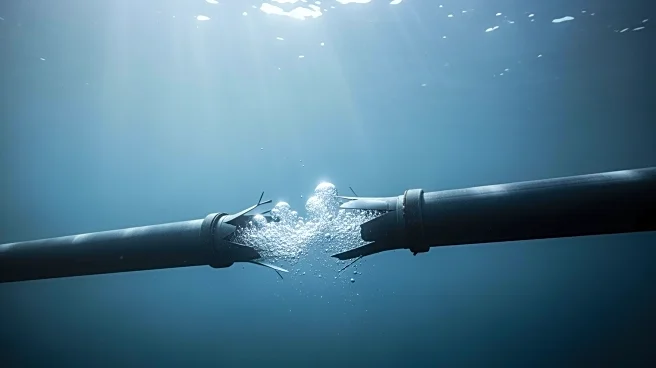What's Happening?
The explosions that damaged Russia's Nord Stream pipelines to Europe in 2022 continue to create geopolitical tensions. The incident, which occurred months after Russia's invasion of Ukraine, has led to ongoing
investigations and legal proceedings. Germany is pursuing prosecution against suspected Ukrainian saboteurs, Volodymyr Zhuravlov and Serhii Kuznietsov, who are accused of orchestrating the attack. Poland's reluctance to extradite Zhuravlov has sparked new tensions, as it appears to protect Ukraine, its ally. The case has exposed divisions within Europe, with differing opinions on whether criminal proceedings should be pursued.
Why It's Important?
The Nord Stream pipeline explosions highlight the complex geopolitical dynamics in Europe, particularly regarding energy dependence and political alliances. Germany's determination to prosecute those responsible underscores its commitment to legal accountability, but also risks straining relations with Poland and other European nations. The incident has intensified debates over Europe's reliance on Russian energy and the political implications of such dependencies. The case serves as a reminder of the broader geopolitical challenges facing Europe, including the need for unity against Russian aggression.
What's Next?
Germany's pursuit of legal action against the alleged saboteurs may lead to further diplomatic tensions within Europe. The outcome of the legal proceedings could influence future energy policies and international relations. Poland's stance reflects its internal political dynamics and its strategic interests in supporting Ukraine. As the case unfolds, European leaders will need to navigate the delicate balance between legal justice and geopolitical strategy. The resolution of this case could set precedents for handling similar incidents in the future.
Beyond the Headlines
The Nord Stream explosions have broader implications for Europe's energy security and political cohesion. The incident has prompted discussions about the ethical and strategic considerations of energy dependence on Russia. It also highlights the challenges of maintaining European unity in the face of external threats. The case may influence long-term shifts in energy policy and international alliances, as countries reassess their positions on Russian energy imports and their geopolitical strategies.









